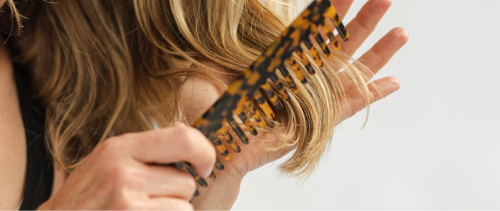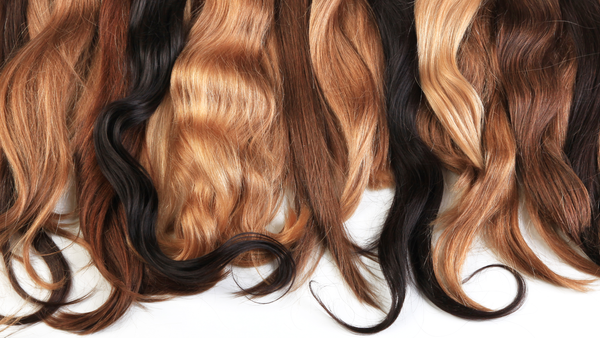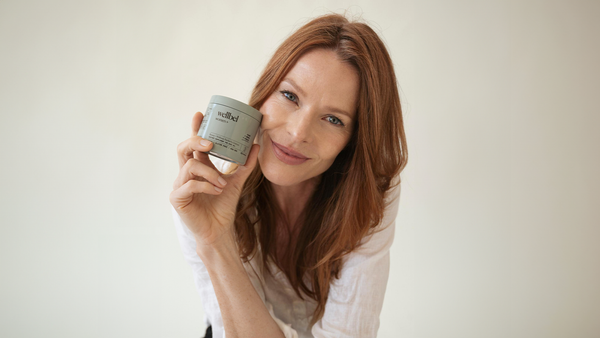Hair loss, like any change in our bodies, can be jarring. Wrinkles around the eyes, pain in our joints, a little less hair by our temples — these changes can make us feel out of control. For hair, there’s extra baggage. A full head of hair is associated with youth, vitality. Thinning hair is associated with aging and sickness. It’s no wonder why so many of us feel bad when we see hair in the shower drain.
The truth is that hair loss happens every day. It’s a normal part of a healthy hair growth cycle. For some of us, whether due to aging, genetics, or hormonal conditions, hair loss can be accelerated, and that’s when we start to see bald patches or receding hairlines. The good news? There are plenty of steps you can take to address hair loss.
In this post, we’ll go over how much hair you should expect to lose in a day and what you can do if you suspect you’re losing more than the average person.
How Much Hair Loss is Typical?
So let’s start with the basics. How much hair loss is normal?
The Hair Growth Cycle
To answer that, we need to understand the natural cycle of hair growth. Every hair follicle on our heads is in one of three stages: the anagen phase (the growth phase), the catagen phase (transitional phase where the hair stops growing), and the telogen phase (the rest phase). At the end of the telogen phase, which usually lasts a few months, hair falls out.
The average person can expect to lose about 100 strands of hair a day. It may sound like a lot but that’s completely normal hair shedding. You’ll notice it on your hair brush, in your shower drain, or sticking to your pillowcase. Hair grows and hair sheds, agnostic of how often you cut it.
Signs Your Hair Loss Could Be Atypical
Normal hair shedding is nothing to be alarmed about, but excessive shedding can cause you to go into panic mode. Before you start counting the hairs you’re losing, we have a few key signs that you may be experiencing more significant hair loss.
Your Scalp is More Visible
It can be difficult to assess hair loss, considering gradual thinning is exactly that: gradual. The amount of hair you see in your shower drain is an inexact science. Generally though, especially when the shedding is related to genetic causes (male pattern hair loss and female pattern hair loss), hair thinning becomes noticeable because of what it leaves behind. If you’ve started to see more of your scalp than you used to, that’s a sign that you could be experiencing more than average hair loss. For men dealing with male pattern baldness, that extra hair loss is usually concentrated on the crown of the head, eventually leading to bald spots. The receding hairline are also prevalent. For women dealing with female pattern baldness — which is, despite the stigma, just as common — hair loss is concentrated around the part, leading to a widening, though it’s rare for women to lose their hair altogether.
Your Hair is Coming Out in Clumps
Androgenetic alopecia (genetic hair loss) is very common, but it’s not the only reason why people experience hair falling out. If you’ve noticed excess hair shedding, consider if there have been any major life events, traumas, illnesses, or hormonal changes recently. It’s possible that they’re the culprit behind your excessive hair shedding.
Known as telogen effluvium, this type of hair loss is linked to a stressful event. If you’ve ever experienced a major shock and then noticed your hair coming out in large clumps, this is why. Major stress pushes hair follicles into the shedding phase faster, hence the name telogen (rest) effluvium (flow out).
You’re Experiencing Hormonal Changes
It’s also possible that your hair loss could be tied to certain medical conditions or hormonal shifts. People with PCOS often complain of hair loss on their scalp.
It’s also quite common for new mothers to see major hair loss soon after giving birth. That’s because pregnant women actually experience increased hair density while pregnant, with hair growing far beyond their normal amount. After labor, as the body resumes its normal hormonal patterns, hair loss occurs.
In any case, it’s important to notice and take action if you suspect you’re losing more hair strands than normal. Because of various underlying medical conditions or nutritional deficiencies tied to hair loss, going to see your physician can help clear up the cause and arm you with information to treat it.
Understanding Why Hair Loss Happens and What You Can Do
Once you have a solid understanding of the source of your excessive hair loss, you can take steps to address it. For many of us, that starts with improving our nutrition.
Vitamins and minerals play an absolutely essential role in the development of healthy hair strands and the maintenance of healthy hair follicles. With proper nutrition, you can help to diffuse hair loss and improve hair count.
That’s partly why we developed Wellbel, a physician-backed formula that ensures you’re reaching your recommended nutritional intake, specifically targeting the building blocks of healthy hair growth. We’ve seen some incredible results from our community, from people dealing with genetic hair loss to people dealing with hormonal hair loss. Learn more here and see what these plant-based ingredients can do for you.
Sources:
Healthy Hair (Anatomy, Biology, Morphogenesis, Cycling, and Function) | Alopecia


















